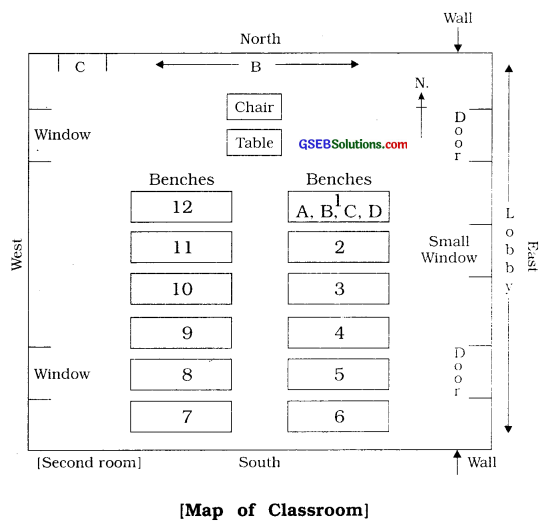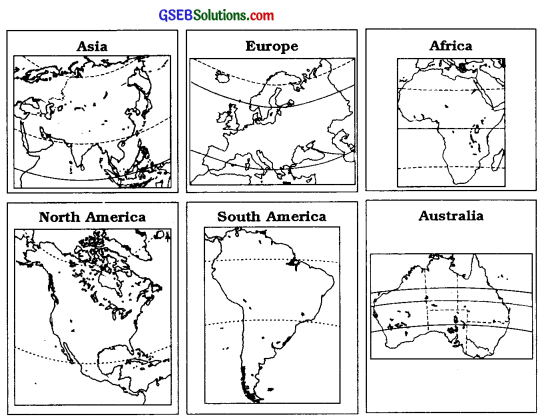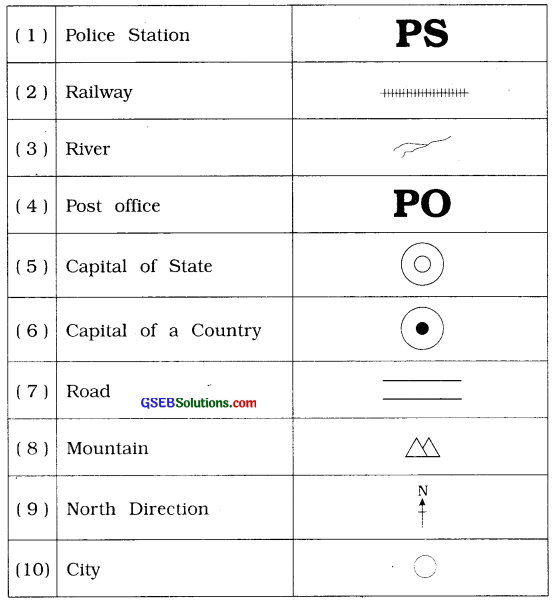Gujarat Board Textbook Solutions Class 6 Social Science Revision-1
GSEB Class 6 Social Science Revision-1 Intext Questions and Answers
Question 1.
What are the various sources of history?
Answer:
Articles and different pictures published in the newspapers, documents, ornaments, toys, coins, stamps, seals, inscriptions. Bhojapatras, Tadpatras, copper plates, weapons, old monuments, old temples, idols, utensils of Terracota, tools, jewellery, old buildings, forts, ponds, stepwells, etc. are the main sources of history.
![]()
Question 2.
What are the uses of a map ?
Answer:
Geographical information about various parts of the earth is easily available from the map. A map is used to know the geographical location of a place or an area. With the help of a map, a small and actual picture of an area can be known. A map serves as a guide to tourists and businessmen. A map is useful in many ways as it is a storehouse of geographical information.

Question 3.
What do the following colours – brown, green and yellow – signify on a map ?
Answer:
In a map, brown colour is used to show height, green colour to show forests and vegetation, yellow colour to show plains and blue colour to show water features.
The signs or symbols like various letters, shades, colours, pictures and lines are used to show natural and man-made landscapes in the map, which are well-known and understood by every one are called ‘conventional signs’. These signs are worldwide accepted language of a map. Maps can be easily drawn, understood and read with their help. Conventional signs give more information in less space.
Question 4.
What is your role in your family ?
Answer:
My duties towards the family:
- to live with a sense of co-operation with all members of the family.
- to observe the rules and regulations and customs of the family.
- to respect the elders and obey them.
- to take care of younger brothers and sisters.
- to help in maintaining the cleanliness and tidiness of the house.
- to co-operate in the family matters.
- to show desire to give up, sportsmanship, endurance, patience and sympathy to provide comforts to the members of the family.
Question 5.
What is the importance of Voters Identity Card ?
Answer:
The election/voter identity card is necessary for voting purpose. The identity card contains a person’s photograph along with his name, his father’s name, gender (sex), birthdate and address. The residence of a person is decided on the basis of it. The election identity card is considered an authentic document for citizenship. This identity card is useful when the proof of a person’s identity is needed. An Indian citizen gets the election identity card after completion of 18 years.
![]()
Question 6.
Name the important latitudes on the earth.
Answer:
Important latitudes on the earth are:
- Equator
- Tropic of Cancer,
- Tropic of Capricorn,
- North Polar Region and
- South Polar Region.
Question 7.
Write the names of the continents.
Answer:

[Note : In this question, the seventh continent Antarctica is not mentioned, because it extends up to the South Pole. See the globe for this continent.]
Names of the seven continents on the earth are:
- Asia
- Europe
- Africa
- North America
- South America
- Australia and
- Antarctica.
QUESTIONS
Question 1.
What was the impact of the changing climate on the primitive man ?
Answer:
There were major changes in the world’s climate around 12 thousand years ago. Climate changes brought about changes in plant life and animal life. Herbivorous and carnivorous animals increased in the plains. The knowledge about these animals also increased in mankind. People started taming herbivorous animals.
At, many places in India, the natural growth of wheat, barley, etc. was witnessed. People stored these grains for food. People started meeting each other quite often, which increased socialization. Therefore, signs, gestures, artistic symbols and language developed in primitive man.
Question 2.
Why, do you think, is a wheel a revolutionary invention ?
Answer:
After the invention of the wheel, the primitive man made vehicles like bullock-cart, horse-carriage, camel- cart, etc. and started using animals to pull them. As a result of these vehicles, the life of primitive man became easy; travel and transportation of goods became speedy. Time was saved as travelling on foot came to an end. As a result, the primitive man started thinking in new ways. Therefore, the invention of the wheel is considered to be the most revolutionary invention in the life of early man.
![]()
Question 3.
How are the primary sources like story, diary, old monuments, bhojapatras and copper plates important to study history?
Answer:
History can be studied on the basis of the primary sources like idols of old time, old monuments, bhojapatras, coins, tools, Terracota utensils, metal utensils, copper plates, inscriptions, forts, ponds, step-wells, etc. Moreover, we get the information related to history by different pictures, story, diary and articles from the collection book.
Question 4.
What would have happened if there were no maps ?
Answer:
If there were no maps then
- It would not have been possible to know the exact location of any place on the earth. Therefore, planning of travel, roadways or residences would not have been possible.
- The information about climate, rain, etc. of different places could not have been known.
Question 5.
If you go to USA for further studies, will you be a US citizen ? Answer in ‘yes’ or ‘no’ and give reasons.
Answer:
No, I have gone from India to USA for further studies. After completion of my studies, I will come back to my country. I do not intend to stay permanently in USA. Therefore, I will not be a US citizen.
Question 6.
What virtues do you learn from your family ?
Answer:
I have learnt the virtues like affection, co-operation, sympathy, endurance, devotion, service, loyalty, politeness, generosity, discipline and restraint, etc. from the members of my family.
![]()
Question 7.
How has the invention of fire brought about changes in the lives of humans ?
Answer:
The invention of fire has brought about changes in the lives of humans. The primitive man used fire as:
- to cook flesh of hunted animals
- to drive away wild animals by lighting the fire in front of caves
- to keep the cave lighted and
- to get protection from cold.
Today we use fire for heating water, preparing hot drinks and cooking, lighting lamps in the house, for running railways and steam engines by producing steam from water.
Question 8.
What information do you get from the ‘workshops’ of primitive man ?
Answer:
We get the information of the things like big pieces of stone, the tools left by the primitive man and the tools which were not well prepared, from the ‘workshops’ of primitive man.
Question 9.
Why is the equatorial region the hottest on the earth ?
Answer:
On the equatorial region, the sunrays fall directly. So the heat rays get focused on a small portion of the earth and reach the earth by passing through a small area (of atmosphere. Therefore, it gives more heat. So the equatorial region is the hottest on the earth.
![]()
Question 10.
Draw the Conventional Signs against the following:
Answer:
